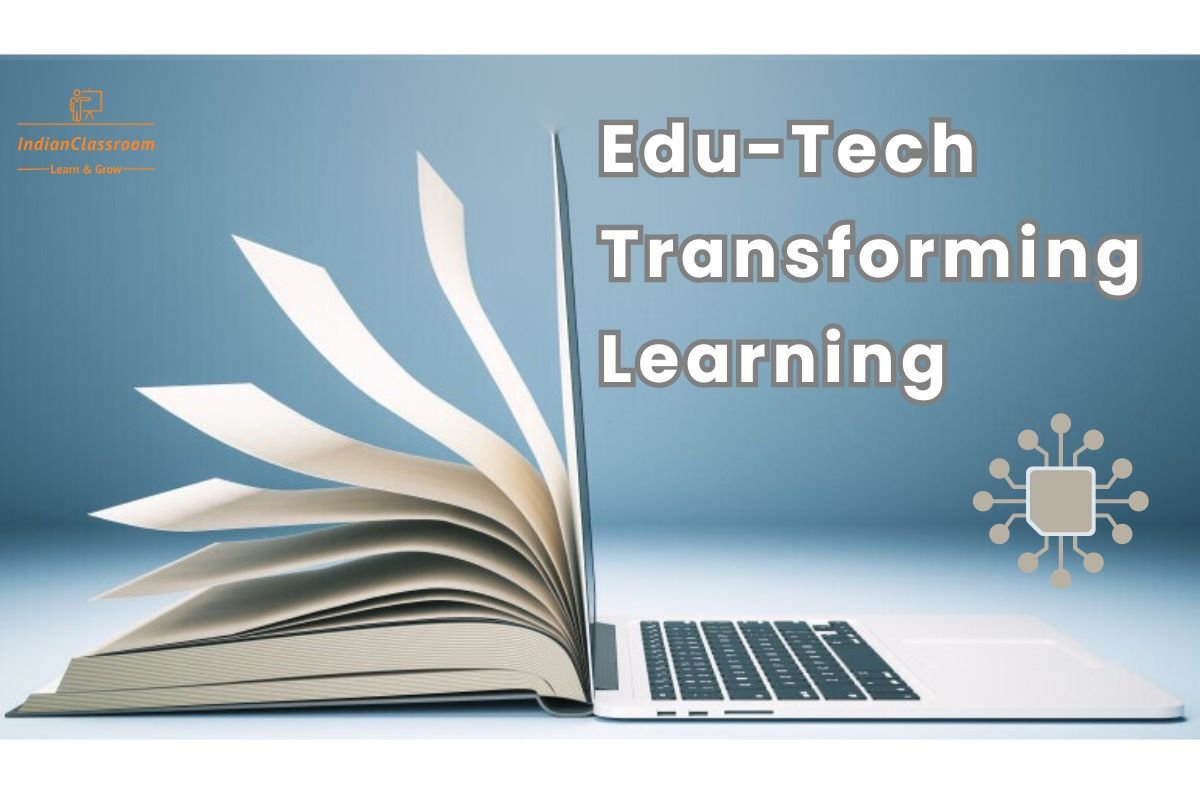NEET PG 2024 Results Declared

Edu-Tech is revolutionizing the educational landscape by providing innovative solutions that cater to the diverse needs of learners and educators. By fostering personalized learning experiences, enhancing accessibility, and integrating advanced technologies, Edu-Tech is set to shape the future of education. As we embrace this digital transformation, it is crucial that educators, administrators, and learners work collaboratively to maximize the potential of Edu-Tech while remaining mindful of its challenges.
Educational technology, or Edu-Tech, refers to the use of digital tools, software, and resources designed explicitly for educational purposes. This encompasses a wide range of applications—including online learning platforms, artificial intelligence (AI), virtual reality (VR), and gamification—that facilitate teaching and learning processes. Edu-Tech aims to improve student engagement and empower educators by providing innovative methodologies tailored to meet modern educational needs.
Personalized learning is an instructional approach that tailors learning experiences to individual student needs, preferences, and interests. Edu-Tech plays a pivotal role in enabling personalized learning by offering various tools and resources that allow educators to deliver customized content effectively. This approach fosters a learner-centric environment in which students can pace their learning according to their abilities and interests, ultimately leading to improved academic outcomes and greater motivation.
A variety of online learning platforms, such as IndianClassroom, Udemy, and Khan Academy, provide access to high-quality educational resources from renowned institutions worldwide. These platforms allow students to learn at their own pace, while adaptive learning software uses AI algorithms to recommend content based on individual learning styles and progress. Furthermore, Learning Management Systems (LMS) like Moodle and Canvas offer comprehensive tools for educators to manage course materials, assignments, and assessments, fostering an organized and interactive educational environment.
Artificial Intelligence has become an essential component of Edu-Tech, enabling personalized learning experiences through data-driven insights. AI-powered learning assistants offer students 24/7 support, answering queries and recommending relevant resources in real-time. By analyzing student performance data, educators can tailor instruction to address individual strengths and weaknesses, leading to a more efficient learning process.
Gamification incorporates game design elements into educational settings to enhance student motivation and engagement. With the use of leaderboards, badges, and points, students are encouraged to participate actively in their learning experience. This approach has proven to be effective in promoting collaboration among peers, enhancing retention, and fostering a sense of achievement. Edu-Tech tools that offer gamified learning experiences can significantly transform traditional instructional techniques and encourage students to engage more deeply with the content.
Virtual Reality (VR) and Augmented Reality (AR) technologies provide immersive learning experiences that can deepen understanding of complex subjects. For example, VR enables students to practice surgical procedures in a controlled environment or explore historical sites interactively. These technologies are becoming increasingly prevalent in classrooms, making education more engaging and effective. The integration of VR and AR tools aligns with modern educational demands, ensuring students are better prepared for real-world challenges.
One of Edu-Tech’s most significant benefits is its potential to enhance accessibility in education. Online learning platforms and resources allow students from various geographical regions to access high-quality materials, breaking down barriers created by traditional classroom settings. Moreover, Edu-Tech can help address equity issues by offering resources tailored to individuals with diverse learning needs, ensuring that every student has the opportunity to succeed.
To maximize the potential of Edu-Tech, collaboration among stakeholders—including educational institutions, technology companies, and policymakers—is crucial. Partnerships can help ensure that technology is integrated effectively into educational systems, providing students and educators with essential resources. This collaborative approach encourages the development of curricula that thoughtfully integrate technology, making learning more relevant and effective.
While the benefits of Edu-Tech are vast, some concerns must be addressed, such as privacy, data security, and the digital divide. Ensuring equitable access to technology and addressing disparities in digital literacy among students are essential for maximizing the impact of Edu-Tech. It is crucial to implement robust privacy measures and data security protocols, protecting sensitive information and ensuring a safe environment for both students and educators.
Looking ahead, the potential of Edu-Tech to transform education continues to grow. Key trends, such as hybrid learning, hyper-personalized learning experiences, and the increased emphasis on digital literacy skills, will shape the future educational landscape. Innovations in AI and data analytics will enable educators to provide even more personalized support, ensuring that students are equipped with essential 21st-century skills.
In summary, Edu-Tech is revolutionizing education through personalized learning experiences, the application of advanced technologies, and a greater focus on accessibility. The continuous collaboration among stakeholders, along with addressing potential challenges, is vital for ensuring that the transformation achieves its desired outcomes. As educational environments evolve, embracing Edu-Tech will not only improve learning experiences but also prepare students to thrive in an increasingly digital world.
Edu-tech, short for educational technology, refers to the use of technology to enhance teaching and learning processes. It includes a wide range of tools and platforms such as online courses, interactive software, and mobile applications.
Edu-tech provides increased accessibility to educational resources, personalized learning experiences, and interactive tools that enhance engagement. It caters to diverse learning styles, making education more inclusive.
Popular online learning platforms include Coursera, Indianclassroom, Udemy, Khan Academy, and Skillshare. These platforms offer a vast array of courses on different subjects, allowing students to learn at their convenience.
Artificial intelligence enhances education by personalizing learning experiences. AI algorithms assess student performance and adapt content to the individual’s needs, ensuring a tailored educational path.
Mobile learning apps enhance education by allowing students to access educational resources anywhere, anytime. These apps increase flexibility and convenience, helping learners manage their time more effectively.
To effectively use Edu-tech, teachers require structured training and ongoing support. Professional development programs can equip educators with the skills needed to integrate technology into their teaching practices.